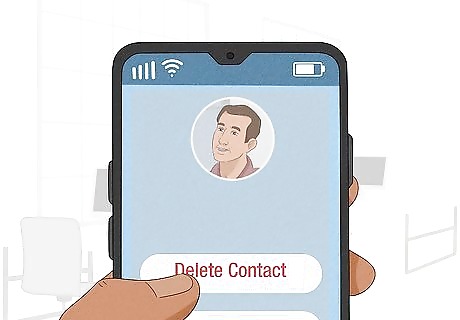
views
- Remain calm and resist the urge to yell back. If possible, distance yourself from the person who is shouting at you.
- Assess the situation, collect your thoughts, and remember that you're not responsible for the other person's anger.
- Apologize if you've made a mistake, and then calmly tell the other person that you will not tolerate being yelled at.
Remaining Calm

Resist the urge to yell back. It’s natural to feel angry or upset when someone yells at you, but before you do anything you might later regret, try to keep yourself calm. Take a deep breath and slowly count to ten to help you manage your emotions. Remember, the less reactive you are, the more you can focus on de-escalating the situation. Avoid criticizing the other person or getting defensive. Challenging them will only provoke them and make the situation worse. In fact, being yelled at can provoke a “fight or flight” response in your body, making it hard for you to think and communicate properly.

Take a step back and assess the situation. If someone is yelling at you, it doesn’t mean you have to stand there and take it. Whether it’s a stranger, your boss, or your significant other, physically step back from the other person and decide if it’s best to walk away from them. Controlling your space and thinking about the steps you can take may help you stay calm and collected. For instance, you might decide that walking away from your boss isn’t worth losing your job, but reflecting on your response may open other options, like asking them for a moment to collect your thoughts. If you decide to remove yourself from the conversation, announce your decision as a statement (rather than a question). You might say, “I’m getting too worked up to have a productive discussion with you. I’m taking a break, but we can continue once I return.”

Tell yourself that you’re not responsible for the other person’s anger. Disengage from the situation to ensure that you don’t take things personally. The best way to do this is to empathize with the other person and acknowledge their anger. Focus on the pain in their face, and look at the desperation and frustration you see them experiencing. Remember, yelling is usually a sign that the other person feels hurt, threatened, or that they haven't learned to effectively communicate their emotions. Project peace in any way you can, but do not put on a mask of indifference. This can further anger the yeller, who may interpret it as teasing or patronizing. Instead, express genuine surprise at their attitude to show that their yelling is unwarranted.

Let the person know that you won't tolerate their yelling. While being accommodating may defuse the current situation, it may encourage the other person to repeat their behavior in the future. Even if you’re in the “wrong,” being yelled at is never appropriate—especially in the workplace. Instead, give a sincere apology and politely state your boundaries. For example, you might say, “I am deeply sorry for my mistake in the paper. However, I feel uncomfortable with how you yelled at me in front of the team. In the future, I would appreciate it if you approached me in private.” It’s totally okay to poke holes in the other person’s argument or complain about them in your head, but avoid bringing up any grievances in person. Being polite and professional is the best way to get the upper hand in the situation.
Defusing the Situation

Distance yourself from the other person. If possible, step away from the situation so you can cool off and recollect your thoughts. Tell the other person that their yelling is overwhelming and that you would like to speak at a later time. This gives both of you some space so the ensuing conversation is less likely to erupt into a fight. If your partner yells at you, licensed psychologist Liana Georgoulis says the best thing to do is to “take some space from [them] for a minimum of 30 minutes.”

Initiate a conversation about their behavior. Once you’re ready to speak to the other person, tell them how their yelling makes you feel. Did you feel overwhelmed, scared, or confused during the moment? Be honest and include any details you noticed about their behavior, especially if they were unwilling to calm down. For example, if your partner yells at you in public, you could tell them that you felt threatened or overwhelmed and that passersby were looking at you with pity. If your boss yells at you, you might say that you felt vulnerable and uneasy when they raised their voice, and that it’s more difficult to focus on work when you feel defensive.

Request that yelling not continue. If you share how the yelling negatively affects you, then it’s reasonable to request that it doesn’t happen again. You might say something like “I can't concentrate when you’re yelling at me, and I care about what you have to say to me. Would you be willing to talk to me in a speaking tone, like the one we are both using now?” Even if it seems obvious that a gentle speaking voice is preferable to yelling, be specific when making your request. If you think the yeller is extra sensitive or will take your request personally, buffer your conversation with some positive observations as well. Think about the things that this person brings to the table in other moments and mention how much you appreciate them.

Speak in a softer voice. Speaking in a measured, soft tone is a great way to alter the mood of the conversation. The contrast in your voice may encourage the other person to sound like you, plus they’ll have to try harder to hear you. This can shift their focus from anger and intensity to concentration on what you’re saying.

Decide if you want to make amends. Now that you have taken steps to defuse the situation, it’s up to you to decide whether you want to reconcile or simply walk away. When making a decision, take into account your relationship with the yeller, when you are likely to see them next, and how much closure you typically need to move past an uncomfortable situation. If the yeller is someone you can't or don't want to cut ties with, bring yourself to make amends by remembering where the yeller is coming from. If you choose to walk out, keep in mind that you may be in for a tense encounter the next time you see the yeller.
Responding to Avoid Danger

Understand your rights if you feel threatened. Keep in mind that you always have the right to be treated with dignity and respect, as well as the right to your own space. This rings true no matter your role, rank, or position, so if you feel intimidated or threatened by someone, review your rights and seek help. In the workplace, you always have the right to resist situations where you fear for your well-being. If someone keeps yelling at you, contact your company’s HR department or review your employee manual for specific policies regarding employee conflicts.

Cease communication. If the other person yells at you frequently and you've already communicated your boundaries, cutting off communication could be the best way to protect yourself. Depending on the relationship you have with them, you may be able to avoid a confrontation altogether and send a brief letter or email stating that you no longer wish to communicate. Remember, you are always entitled to say when enough is enough!

Solicit outside help. Does it seem like the yeller cannot seem to cool down? Do you fear that they pose an ongoing threat to your livelihood? If you feel like the situation has escalated to a real potential danger, do not hesitate to contact emergency services. If danger is immediate, call 911. If you suspect the other person might physically harm you, relationship counselor Jason Polk advises to “make a plan” and “get support” before ending the relationship. In the US, the National Domestic Violence Hotline is open 24/7, and you can call their phone number (1-800-799-7233) or use their online chat feature to establish an exit plan.
Why do people yell?

People often yell if they feel threatened, neglected, or a loss of control. For some people, yelling is a coping mechanism to deal with anger, stress, or other negative emotions. They might not have learned how to express their emotions in a healthy and effective way, or they might view it as “normal” behavior based on how they were raised and communicated with. At the end of the day, you are not responsible for someone else’s anger! Try to frame their anger with curiosity, instead of blame so that you can reach a solution.

















Comments
0 comment